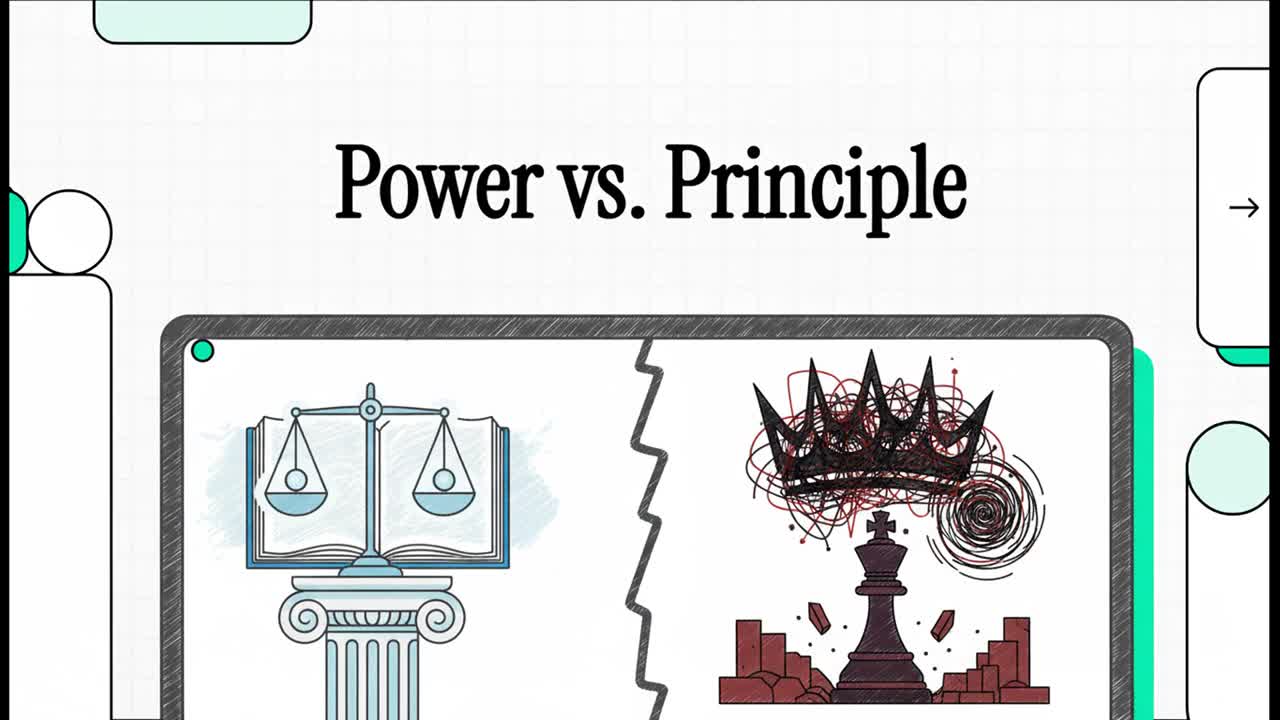The Machiavellian Playbook: Five 'Laws of Power' That Explain Our Politics

The Unseen Rules of the Game Modern power dynamics can often seem chaotic, manipulative, and deeply cynical. It feels like a game where the rules are unspoken, yet the players who know them consistently win. Robert Greene's bestseller, The 48 Laws of Power, serves as an illuminating, if unsettling, lens for understanding these dynamics. The book presents an amoral playbook for gaining and holding power. Some, like author Debilyn Molineaux, view this philosophy as a "game of domination" fundamentally at odds with the Rule of Law. Molineaux argues that these are "the laws exploited by psychopaths and sociopaths, con artists and cult leaders." This article distills five of the most surprising takeaways from this playbook, showing how they are deployed on the world stage and explaining their psychological potency.
1. The Chaos Gambit: Weaponizing Unpredictability
The first principle is to destabilize your opponents by being deliberately inconsistent. This is the core of Law 17: "Keep Others in Suspended Terror: Cultivate an Air of Unpredictability." The goal is to make it impossible for others to anticipate your next move. In her critique of power-centric politics, Debilyn Molineaux includes this law in her list of tactics deployed by President Trump. The Nordic Defence Review also identifies his use of this tactic, noting that countering it requires “strategic steadiness” to contrast with his “chaotic approach.” The psychological effectiveness of this strategy is rooted in cognitive exhaustion. Unpredictability forces opponents to expend immense mental energy modeling an un-modelable system, creating a state of high cognitive load and decision fatigue. This leads to strategic burnout and poor choices. This isn't negotiation or statecraft; it is pure psychological warfare, a key move in the domination playbook that seeks to paralyze, not persuade. Humans are creatures of habit with an insatiable need to see familiarity in other people’s actions. Your predictability gives them a sense of control. Turn the tables: Be deliberately unpredictable. Behavior that seems to have no consistency or purpose will keep them off-balance, and they will wear themselves out trying to explain your moves.
2. The Faith Engine: Manufacturing a Cult of Personality
This tactic leverages a deep-seated human desire for meaning and community. Law 27 advises you to "Play on People’s Need to Believe to Create a Cultlike Following." It involves becoming a focal point for people’s faith, offering them a cause to rally behind. Molineaux includes this law in her list of tactics deployed by President Trump. This is a powerful tool because it operates on the level of emotion and faith, bypassing rational thought. By using vague but promising language, a leader provides a canvas onto which followers can project their own hopes. This exploits confirmation bias, as believers actively seek evidence to support their faith and ignore contradictory facts. The result is the creation of powerful in-group/out-group dynamics and a base of support immune to logical argument—a formidable weapon in the game of domination. People have an overwhelming desire to believe in something. Become the focal point of such desire by offering them a cause, a new faith to follow. Keep your words vague but full of promise; emphasize enthusiasm over rationality and clear thinking.
3. The Fantasy Imperative: Selling the Dream, Not the Reality
People are often more motivated by a compelling fantasy than by a harsh or complex truth. Law 32, "Play to People's Fantasies," is built on this understanding. The strategy is to avoid the often-unpleasant reality and instead conjure up a romance or a dream that taps into the desires of the masses. Molineaux includes this law in relation to Trump's tactics. Interestingly, the Nordic Defence Review applies this same law to Vladimir Putin, noting his success in playing to "the fantasies of Russian nationalism and imperial nostalgia" to position himself as "the leader who will make Russia great again." Though both leaders deploy the same law, the fantasies they sell are tailored to different cultural contexts. Trump’s "Make America Great Again" is a fantasy of restored economic and cultural primacy for a nation anxious about its global standing. Putin’s narrative, however, is one of imperial and nationalist destiny, a fantasy designed to heal the wounds of the Soviet Union's collapse and reassert historical power. Both tactics demonstrate that a narrative of restoration, whether cultural or imperial, is a powerful substitute for addressing present-day complexities—a core strategy in bending populations to a singular will.
4. The Sucker's Ploy: The Power of Underestimation
This counter-intuitive strategy involves disarming your opponents by making them feel intellectually superior. Law 21, "Play a Sucker to Catch a Sucker - Seem Dumber than Your Mark," argues that people are less suspicious of those they believe to be less intelligent than themselves. Molineaux includes this as another tactic used by President Trump. The genius of this tactic is that it directly exploits a target's vanity and cognitive biases. When potential victims are convinced of their superior intellect, their own arrogance creates a critical blind spot. Their guard is lowered, their critical faculties are disengaged, and they become incapable of suspecting ulterior motives. This maneuver turns their ego against them, making them willing participants in their own deception—a subtle but devastating move in the domination playbook. No one likes feeling stupider than the next person. The trick, then, is to make your victims feel smart—and not just smart, but smarter than you are. Once convinced of this, they will never suspect that you may have ulterior motives.
5. The Gravity of Notoriety: Courting Attention at All Costs
In the game of power, being ignored is the worst possible fate. Law 6, "Court Attention At All Cost," states that you must stand out and remain in the public eye, no matter the cost. Notoriety, of any kind, is a form of power. Molineaux includes this tactic in her analysis of President Trump. This law is critical because power depends on occupying social and cognitive real estate. To be ignored is to have zero share of mind; to be attacked or slandered is to occupy a large, albeit contested, space. From a purely strategic standpoint, contestation is preferable to irrelevance. By making yourself a magnet for attention, you ensure you are always part of the conversation, forcing others to react to you and cementing your relevance in the unending game of power. Everything is judged by its appearance; what is unseen counts for nothing. Never let yourself get lost in the crowd, then, or buried in oblivion. Stand out. Be conspicuous, at all cost.
Conclusion: Recognizing the Game These laws create a playbook for exploiting fundamental cognitive biases—our preference for certainty (disrupted by unpredictability), our need for narrative (supplied by fantasy), our vanity (leveraged by the sucker’s ploy), and our intrinsic desire to believe (harnessed to build a cult). They represent a cynical, amoral, but undeniably effective approach to gaining and holding power. By understanding them, we can better identify the moves being made on the political stage. As Debilyn Molineaux argues, freedom is only possible if we reject this "game of domination" in favor of the Rule of Law. Recognizing these power plays is the first step toward thwarting them. This leaves us with a critical question: Now that we can better identify the tactics, does knowing the rules of the game empower us to change it?
References Chris Dover. (2025, June 3). How Trump uses the 48 Laws of Power: A contemporary playbook. Macro Ops. https://macro-ops.com/how-trump-uses-the-48-laws-of-power-a-contemporary-playbook/ macro-ops.com+1 Greene, R. (1998). The 48 Laws of Power [PDF file]. Viking. Retrieved from chrome-extension://efaidnbmnnnibpcajpcglclefindmkaj/https://irp-cdn.multiscreensite.com/cb9165b2/files/uploaded/The+48+Laws+Of+Power.pdf Molineaux, D. (2023, June 21). Power v. rule of law. The Fulcrum. https://thefulcrum.us/power-v-rule-of-law The Fulcrum Nordic Defence Review. (n.d.). The 48 Laws of Power: How Robert Greene’s lessons apply to Donald Trump and Vladimir Putin — And how to use them against them. Nordic Defence Review. https://nordicdefencereview.com/the-48-laws-of-power-how-robert-greenes-lessons-apply-to-donald-trump-and-vladimir-putin-and-how-to-use-them-against-them/ Nordic Defence Review Williams-Henry, P. (n.d.). Trump and the 48 Laws of Power: Genius or Madman? Medium. https://medium.com/@mybuddy4u03/trump-and-the-48-laws-of-power-genius-or-madman-e31e74a1043d Medium Washington Examiner. (n.d.). Donald Trump and the 48 Laws of Power. Washington Examiner. https://www.washingtonexaminer.com/news/737979/donald-trump-and-the-48-laws-of-power macro-ops.com Twitter / X Account. (n.d.). Tweet discussing The 48 Laws of Power. https://x.com/i/grok/share/OpqePLChMIxhJhH4WOUovgazE
